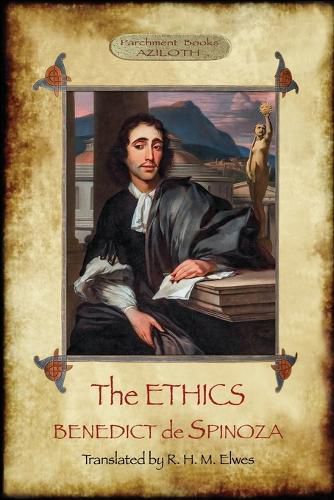Readings Newsletter
Become a Readings Member to make your shopping experience even easier.
Sign in or sign up for free!
You’re not far away from qualifying for FREE standard shipping within Australia
You’ve qualified for FREE standard shipping within Australia
The cart is loading…






This title is printed to order. This book may have been self-published. If so, we cannot guarantee the quality of the content. In the main most books will have gone through the editing process however some may not. We therefore suggest that you be aware of this before ordering this book. If in doubt check either the author or publisher’s details as we are unable to accept any returns unless they are faulty. Please contact us if you have any questions.
Benedictus de Spinoza’s ground-breaking philosophy made him a controversial figure of 17th century Rationalism and a major influence in the Enlightenment that followed.
Spinoza developed contentious ideas from an early age, resulting in his expulsion from Amsterdam’s Jewish community when he was only twenty-three. Christian orthodoxy likewise repudiated his philosophy and the Catholic Church later issued a ban on all his writings. Undeterred and unrepentant, Spinoza the outcast went on to explore notions of God, man, the universe and reality, an intellectual journey that culminated in his magnum opus, Ethica, which he wrote between 1661 And 1675. This was a metaphysical analysis so radical that he was forced to have it published after his death.
The intention behind the Ethics is to demonstrate that it is possible for man to attain a good life and experience blessedness or knowledge of God. Inspired by Cartesian rigour, Spinoza employs Euclid’s step-by-step logic to prove his various propositions, signing off each proof with an assured Q.E.D. flourish. The five-part work addresses the nature of God and concludes that He is intrinsic to the universe rather than outside of it - and is certainly not a personal god in the orthodox sense. The treatise then proceeds to dissect the human mind and to explore the notion of free will and of good and evil. This is followed by a detailed analysis of the origin and strength of various emotions and the way in which they enslave man. In the final part he reveals how we can free ourselves of these emotional manacles by fully understanding how they work and by distinguishing between those that are harmful and those that are useful. For Spinoza, reason is the sole means to this end. It is no easy task, he warns, and few will succeed - But all things excellent are as difficult as they are rare.
$9.00 standard shipping within Australia
FREE standard shipping within Australia for orders over $100.00
Express & International shipping calculated at checkout
This title is printed to order. This book may have been self-published. If so, we cannot guarantee the quality of the content. In the main most books will have gone through the editing process however some may not. We therefore suggest that you be aware of this before ordering this book. If in doubt check either the author or publisher’s details as we are unable to accept any returns unless they are faulty. Please contact us if you have any questions.
Benedictus de Spinoza’s ground-breaking philosophy made him a controversial figure of 17th century Rationalism and a major influence in the Enlightenment that followed.
Spinoza developed contentious ideas from an early age, resulting in his expulsion from Amsterdam’s Jewish community when he was only twenty-three. Christian orthodoxy likewise repudiated his philosophy and the Catholic Church later issued a ban on all his writings. Undeterred and unrepentant, Spinoza the outcast went on to explore notions of God, man, the universe and reality, an intellectual journey that culminated in his magnum opus, Ethica, which he wrote between 1661 And 1675. This was a metaphysical analysis so radical that he was forced to have it published after his death.
The intention behind the Ethics is to demonstrate that it is possible for man to attain a good life and experience blessedness or knowledge of God. Inspired by Cartesian rigour, Spinoza employs Euclid’s step-by-step logic to prove his various propositions, signing off each proof with an assured Q.E.D. flourish. The five-part work addresses the nature of God and concludes that He is intrinsic to the universe rather than outside of it - and is certainly not a personal god in the orthodox sense. The treatise then proceeds to dissect the human mind and to explore the notion of free will and of good and evil. This is followed by a detailed analysis of the origin and strength of various emotions and the way in which they enslave man. In the final part he reveals how we can free ourselves of these emotional manacles by fully understanding how they work and by distinguishing between those that are harmful and those that are useful. For Spinoza, reason is the sole means to this end. It is no easy task, he warns, and few will succeed - But all things excellent are as difficult as they are rare.